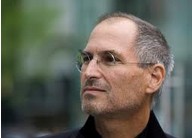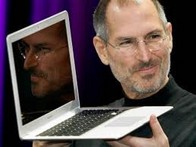他是一位富有远见卓识的创业者,对电子业的未来发展具有超凡的洞察力;他是一位卓越的管理者,以坚定的信念和创新的精神引领企业缔造了一个个不朽传奇;他是一位执着的理想主义者,如虔诚的教徒般固执于对完美的追求;他是一位坚定的梦想家,为践行改变世界的梦想倾尽热情与心力。
史蒂夫·乔布斯,这个曾被自己创建的苹果王国放逐11年之久却从未言弃、凭借勇气与创新终又东山再起的商界传奇,究竟还会带给世界多少震撼与惊喜?
 The American business success collective has volumes of examples of visionaries who have met pressing societal needs or created rich new markets. Among those pages, Jobs is a tutelary1), a rough-about-the-edges2) company founder who has rattled3) the world, was banished from the kingdom he built during tumultuous4) times, and then returned to rescue and take Apple to loftier heights. During the past 34 years, he has overcome ambitious missteps, competitive obstacles and recent health issues to change the way people work, communicate and entertain themselves. Since rejoining Apple in 1996 after an 11-year exile, he has rescued it from near collapse, introduced meteoric5) products such as the iPod and iPhone, and cemented his role as the oracle of consumer tech gadgetry. In naming Jobs “CEO of the Decade” in November 2009, Fortune magazine said history will remember him as “an individual who relentlessly pursued new opportunities,” chasing “new possibilities without being deterred by whatever obstacles he encountered.”
The American business success collective has volumes of examples of visionaries who have met pressing societal needs or created rich new markets. Among those pages, Jobs is a tutelary1), a rough-about-the-edges2) company founder who has rattled3) the world, was banished from the kingdom he built during tumultuous4) times, and then returned to rescue and take Apple to loftier heights. During the past 34 years, he has overcome ambitious missteps, competitive obstacles and recent health issues to change the way people work, communicate and entertain themselves. Since rejoining Apple in 1996 after an 11-year exile, he has rescued it from near collapse, introduced meteoric5) products such as the iPod and iPhone, and cemented his role as the oracle of consumer tech gadgetry. In naming Jobs “CEO of the Decade” in November 2009, Fortune magazine said history will remember him as “an individual who relentlessly pursued new opportunities,” chasing “new possibilities without being deterred by whatever obstacles he encountered.”
在美国成功的商业人士中,富有远见卓识者不计其数,他们有的满足了迫切的社会需求,有的创造出了新的财富市场。在这些人当中,乔布斯堪称“公司的保护神”,是一位有不足之处但瑕难掩瑜的公司创始人,曾让世界为之震惊。在动荡时期,他曾被驱逐出自己一手创办的王国,而后又重返苹果,救其于狂澜之中,并将苹果事业推向一个新的高度。过去34年来,他纠正了因贪多求大而误入歧途的失误,扫清了竞争路途上的障碍,克服了最近健康上的问题,最终改变了人们工作、沟通和娱乐的方式。在被苹果放逐11年之后,他于1996年卷土重来,力挽苹果于倾覆,推出了iPod和iPhone等迅速成名的产品,巩固了他作为“消费性科技产品之圣人”的名头。2009年11月,他被《财富》杂志评为“十年最佳CEO”,该杂志评价说,历史将会铭记这位“永无止境地追求新机遇的人”,他探求“新的机遇,前进路上的任何障碍都无法阻止他前行”。
Apple Seeds
播下苹果的种子
Jobs and Wozniak met in 1970; Wozniak was 21 and Jobs 16. Northern California’s Santa Clara Valley (pre-Silicon Valley), where Jobs and Wozniak grew up, was a churning place for engineers and their ilk, fueled by Lockheed6)’s booming defense business. Computing power was confined to gigantic7), expensive machinery outside the realm of most businesses.
1970年,乔布斯与沃兹尼亚克相遇,当时乔布斯16岁,沃兹尼亚克21岁。他们都是在北加利福尼亚州的圣克拉拉谷(硅谷的前称)长大,这里是工程师及其同行的“修炼场”,而洛克希德公司红火的国防贸易更是为“修炼场”加大了火力。其时计算机的计算能力仅限于在既昂贵又庞大的机器上实现,而大多数企业都与这种机器无缘。
Wozniak worked for Hewlett-Packard and Jobs at Atari as they scrambled with their groundbreaking work. He and Wozniak met regularly at informal Homebrew Computer Club meetings where locals compared notes and ideas in the bubbling information technology pool.
当时,沃兹尼亚克在惠普公司工作,乔布斯则在雅达利,他们一边工作一边筹划自己开拓性的事业。他和沃兹尼亚克经常在“家酿计算机俱乐部”的非正式见面会上碰头。在见面会上,当地的与会人员经常谈论新技术层出不穷的IT界,对比和交流信息技术方面的想法与观念。
On April Fools’ Day in 1976, Wozniak, Jobs and Jobs’ former Atari colleague Ron Wayne signed papers forming Apple Computer. Wayne resigned 12 days later because he decided the financial risk was too great. It was Wozniak’s brilliance and Jobs’ dogged determination that were the engines. Jobs scavenged8) for parts and hounded “Woz” to finish the Apple I and then the Apple II, which Wozniak single-handedly designed. It ignited the personal-computer revolution in 1977.
1976年的愚人节那天,沃兹尼亚克、乔布斯以及乔布斯以前在雅达利的同事罗恩·韦恩一起签署文件,创办了苹果电脑公司。但韦恩在12天后就退出了,因为他认为这种投资风险太大。只是由于沃兹尼亚克的聪明才智和乔布斯近乎固执的坚持,公司才有了发展的动力。乔布斯四处收集零部件,在他不厌其烦的督促和激励下,“沃兹”完成了第一代和第二代苹果电脑的设计——设计全由沃兹尼亚克一人搞定。由此,苹果引发了1977年的个人电脑革命。
A Devastating Fallout
毁灭性的打击
In 1985, tensions between Sculley9) (who joined Apple as president and chief executive officer in 1983) and Jobs about the direction of the company culminated in Jobs trying to oust10) Sculley in a palace coup. It failed, and Sculley stripped the founder of all his operational responsibilities. By September, Jobs was gone. Jobs sold his Apple stock. Bloodied but not beaten, Jobs recovered from the very high-profile exit.
1983年,斯卡利加入苹果,成为苹果公司的总裁和首席执行官。1985年,乔布斯和斯卡利在公司发展方向的问题上产生分歧,关系紧张,这种紧张关系在乔布斯试图发动一场“宫廷政变”将斯卡利驱逐出局时达到顶点。最终,乔布斯的“宫廷政变”以失败告终,斯卡利剥夺了这位公司创始人所有的管理权。9月,乔布斯离开了苹果。他卖掉了自己所有的苹果股份。这一打击让乔布斯伤痕累累,但并未一蹶不振,他很快从这次备受关注的离职事件中恢复过来。
 “I was lucky—I found what I loved to do early in life,” Jobs said during the Stanford commencement address. “Woz and I started Apple in my parents’ garage when I was 20. We worked hard, and in 10 years Apple had grown from just the two of us in a garage into a $2 billion company with over 4,000 employees. We had just released our finest creation—the Macintosh—a year earlier, and I had just turned 30. And then I got fired.
“I was lucky—I found what I loved to do early in life,” Jobs said during the Stanford commencement address. “Woz and I started Apple in my parents’ garage when I was 20. We worked hard, and in 10 years Apple had grown from just the two of us in a garage into a $2 billion company with over 4,000 employees. We had just released our finest creation—the Macintosh—a year earlier, and I had just turned 30. And then I got fired.
“我很幸运——在年轻时就找到了自己喜欢做的事情。”乔布斯在斯坦福大学毕业典礼上的演讲中如此说道。“20岁时,我和沃兹在我父母的车库里创办了苹果公司,我们工作很努力。十年之内,苹果公司从一个仅有两名员工和一间车库办公室的小公司发展为一个拥有20亿美元资产和四千多名员工的大公司。在我离职前的一年,我们刚刚推出了苹果创造的最优秀产品——麦金托什机,那年我刚满30岁。然后紧接着,我被解雇了。”
“How can you get fired from a company you started? Well, as Apple grew we hired someone who I thought was very talented to run the company with me, and for the first year or so things went well. But then our visions of the future began to diverge and eventually we had a falling out11). When we did, our board of directors sided with12) him. So at 30 I was out. And very publicly out. What had been the focus of my entire adult life was gone, and it was devastating.”
“一个人怎么可能被自己一手创办的公司解雇呢?想当年,苹果公司越做越大,我们就聘用了一个我认为有能力和我一起经营公司的人,在大约一年左右的时间里,一切还算顺利。可接着,我们在公司未来发展的问题上出现了分歧,结果闹翻了。闹翻之后,董事会站在了他那一边。于是,在我30岁时,我被迫出局,而且是在众人的高度关注之下出局。一直以来被我视为成年后整个生命中最重要的东西突然之间不在了,这对我来说是致命的打击。”
Jobs talked about how he thought about fleeing the valley because of his very public failure, but he slowly realized he still loved what he did. He decided to start over.
乔布斯谈道,由于这次众人皆知的失败,他曾想过逃离硅谷。但他逐渐意识到,他仍然深爱着自己所干的事业。他决定东山再起。
A New Day
新的开始
“I didn’t see it then, but it turned out that getting fired from Apple was the best thing that could have ever happened to me. The heaviness of being successful was replaced by the lightness of being a beginner again, less sure about everything. It freed me to enter one of the most creative periods of my life.”
“我当时并没有意识到这一点,但事实证明,被苹果解雇可能是我所遇到的最幸运的事。摆脱了成功带来的沉重压力,我感受到再次成为新人的轻松自在——不必对每件事都那么确信。这使我能够放开手脚,进入到我生命中最富创造性的阶段之一。”
Jobs started NeXT Computer Inc., which failed in its attempt to sell elegant, expensive black computers to the business market, and by 1993, shifted its focus to the sale and development of its NextStep operating system. In 1986, however, Jobs stepped deeply into the entertainment world when he purchased the Pixar computer animation studios from George Lucas for less than $10 million, and then immersed himself in13) this new work.
乔布斯创办了NeXT电脑公司,试图向商业市场出售外形雅致、价格昂贵的黑色电脑,结果以失败而告终。1993年,该公司转而将其注意力集中在NextStep操作系统的销售和研发上。而事实上,早在1986年,乔布斯就以不到一千万美元的价格从乔治·卢卡斯手中收购了皮克斯电脑动画工作室,由此一脚踏入娱乐世界的腹地,开始全身心地投入到这项新的工作中。
Since then, Jobs’ work got faster and more furious. By 1993, Sculley resigned from a beleaguered14), battered Apple. Disney released Pixar’s first movie, Toy Story, in 1995, which was an astounding success and leap forward in animation quality. In December 1996, Apple bought NeXT for $430 million in a move full of intrigue, bringing Jobs back into the fold. By September, 1997, Jobs became iCEO (interim15)), and returned the company to profitability by January 1998.
此后,乔布斯的事业突飞猛进,势如破竹。1993年,斯卡利离开了危机四伏的苹果,留下了一个烂摊子。1995年,迪斯尼推出了皮克斯工作室的第一部电影《玩具总动员》,获得了惊人的成功,动画质量也更上一层楼。1996年12月,苹果以4.3亿的价格收购了NeXT,这一收购背后的故事曲折复杂,乔布斯也因此重返他的“老巢”。1997年9月,乔布斯成为苹果的iCEO(临时CEO的戏称),并于1998年1月使苹果扭亏为盈。
The Comeback
王者归来
One of the first things Jobs did upon his return was to pack up all the company’s papers and old machines and send the materials to Stanford University for archiving.
乔布斯归来之后所做的第一件事就是将公司所有的文件和旧机器一起打包,送到斯坦福大学存档。
“[We] cleared out the cobwebs and said, ‘Let’s stop looking backward here,’ ” Jobs explained at the 2007 conference. “It’s all about what happens tomorrow. Because you can’t look back and say, ‘Well, gosh, you know, I wish I hadn’t gotten fired, I wish I was there, I wish this, I wish that.’ It doesn’t matter. Let’s go invent tomorrow rather than worrying about what happened yesterday.”
“(我们)将这些过去沉积的‘蜘蛛网’清除干净,然后说:‘我们不要总是沉湎于过去。’”乔布斯在2007年大会上解释说。“重要的是明天将会如何。因为你不能总是回首过去,然后大呼,‘噢,天哪,你知道,要是当初我没被解雇就好了,我真希望当时自己没有离开这里,但愿这样或那样就好了。’这样说毫无意义。我们应该放手去创造明天,而不是为昨天发生的一切懊悔。”
When Apple launched its first iMac in 2001, its personal-computer market share had dwindled to 2 percent. In 2001, Apple introduced the landscape-changing iPod, iTunes and its OS X 10.0 operating system, signifying its return as a champion innovator. Apple, once again, proved that reports of its demise were greatly exaggerated. In a strategy shift, Apple also opened its first retail store in Maclean, Va.
2001年,苹果推出第一代iMac机的时候,它在个人电脑市场所占的份额已经萎缩到2%。2001年,苹果公司推出了具有里程碑意义的iPod、iTunes产品以及OS X 10.0操作系统,标志着苹果重新回归其创新世界的领军地位。苹果又一次证实了那些宣称“苹果已死”的报道是多么夸大其词、荒诞不经。随着战略的转移,苹果也建立了自己的第一家零售店,地点在弗吉尼亚州的麦克林。
“Jobs gave a speech once, where he talked about, in a certain sense, ‘We [Apple] build the products that we want to use ourselves,’ ” Microsoft’s Gates said in 2007. “He’s really pursued that with incredible taste and elegance that has had a huge impact on the industry. And his ability to always come around and figure out where that next bet should be has been phenomenal.”
“乔布斯曾经做过一次演讲,其中说过大概这样的话:‘我们(苹果)要生产的产品必须是我们自己想要使用的产品。’”微软公司的盖茨2007年这样说道。“他的确以令人难以置信的品味和优雅致力于实现这种追求,这对业界产生了巨大的影响。此外,他总是能够算计出自己下一步该把宝押在什么地方,这种能力的确非凡。”
Jobs returned to the top of the business world, but life held another challenge for him. His diagnosis, treatment and recovery from pancreatic16) cancer in 2004 reinforced his will to be, in co-founder Wozniak’s words, a “move-the-world-forward” visionary.
乔布斯重返商业世界之巅,但却遭遇了人生的又一挑战。2004年,他被确诊患了胰腺癌。在治疗和康复的过程中,他有了一个更强烈的愿望,用他的合伙创始人沃兹尼亚克的话来说,就是做一个“推动世界前进”的梦想家。
“Follow Your Heart”
“跟着心灵走”
“Have the courage to follow your heart and intuition. They somehow already know what you truly want to become. Everything else is secondary.” Jobs recounted in the Stanford address in 2005.
在2005年斯坦福大学毕业典礼的演讲中,乔布斯详细叙说了如下观点:“要有勇气跟着自己的心灵和感觉走。心灵和感觉非常清楚你到底想做一个什么样的人。别的一切都不重要。”
In 2005, Apple introduced the iPod Nano, the Video iPod and the iPod Shuffle. In January 2006, Jobs sold the award-winning Pixar group to the Walt Disney Co. for about $7.4 billion in Disney stock. In 2007, Apple launched the iPhone, followed by its Apps store in 2008. Those products vaulted17) Apple from turmoil into one of the world’s largest and most respected companies.
2005年,苹果推出了iPod Nano MP3播放器、iPod视频播放器和iPod Shuffle超小型数码播放器。2006年1月,乔布斯将多次获奖的皮克斯工作团队出售给迪斯尼公司,获得价值74亿美元的迪斯尼股票。2007年,苹果推出了iPhone,紧接着,2008年,又建立了自己的应用软件商店。这些产品的推出,使苹果从一个烂摊子一跃成为世界上最大、最受人尊敬的公司之一。
“Steve Jobs is a singular persona in our culture,” says NewDealDesign’s founder Amit. “He, more than anyone else, made utilitarian18) digital technology merge into a rich cultural experience. Without him, most of the tech world would have relegated culture to a decorative role, rather than a substantive element of product and service innovation. His impact is so profound on our culture, our way of thinking and our approach to smart technology, that I would consider him one of the most influential cultural creators of the past century.”
“史蒂夫·乔布斯在我们的文化领域是一个独树一帜的人物,”NewDealDesign设计公司的创始人阿米特说,“是他把注重实用的数字技术和丰富的文化体验结合起来,在这一点上,他比任何人都强。没有他,技术世界多半只会把文化贬为修饰性的点缀,而不是具有实质意义的产品元素和服务创新。他深刻地影响了我们的文化、思维方式以及研发智能技术的方法,我认为他是上个世纪最具影响力的文化创造者之一。”
Redrawing Boundaries
重划边界
Entrepreneur and author Guy Kawasaki had two stints19) with Apple (1983~1987, 1995~1997) as a company “evangelist20)” or product super-advocate. Though no longer connected to the company, he remains a product loyalist and observer. Kawasaki maintains it is Jobs’ extraordinary vision that allows Apple to keep redrawing industry—and modern culture’s—boundaries.
企业家、作家盖伊·川崎曾两度在苹果公司供职(1983~1987,1995~1997),是苹果公司的“传道者”和苹果产品的超级拥护者。尽管现在已和苹果公司毫无瓜葛,他仍然是一个苹果迷,时刻关注苹果产品。川崎坚持认为,正是因为乔布斯非凡的远见卓识,才使得苹果能够重新界定工业——以及当代文化——的边界。
“Jobs is a magnetic21) pitchman who sells his ideas with a flair22) that turns prospects23) into customers and customers into evangelists,” writes Carmine Gallo, who is a communication skills coach.
“乔布斯是一个魅力十足的推销员,他善于推销自己的观点,能够把路人变成顾客,把顾客变成义务宣传员。”沟通技能培训师卡米恩·加罗这样写道。
“Over and over again he has turned his eye and his energy—and at times, it has seemed, his entire being—to what might be gained by creating a new offering or taking an unorthodox strategic path,” Harvard Business School professor and author Nancy F. Koehn wrote in Fortune in 2009.
“一次又一次,他把目光、精力,有时甚至是全部身心都投入到某项事业中,这样的事业有时需要创造出新的产品,有时则需要另辟蹊径。”哈佛商学院教授南希·F·克恩于2009年在《财富》杂志撰文时如是说。
“When Bill and I first met each other and worked together in the early days, generally, we were both the youngest guys in the room,” he said during that 2007 joint appearance with Gates. “And now, I’m the oldest guy in the room most of the time. And that’s why I love being here.”
在2007年那次和比尔·盖茨同时亮相的会议上,乔布斯说:“在最初的日子里,我和比尔初次见面和共事的时候,我们俩通常是房间里最年轻的人。而现在,多数时候,我成了房间里年纪最大的人。也正是因为这一点,我才喜欢待在这里。”
Three years later, Jobs hasn’t gotten any younger, but arguably the biggest innovator of his generation clearly plans to keep stirring the pot.
三年后,乔布斯丝毫没有变得更年轻,但我们有证据可以表明,在同时代人中,他是最伟大的创新者。很显然,他还在筹划着继续让世界为之轰动。
1. tutelary [5tju:tIlErI] n. 守护神 2. rough about the edges:尚未完善,有缺点但有潜力
3. rattle [5rAtl] vt. 使颤动出声 4. tumultuous [tju5mQltjuEs] adj. 喧嚣的,骚乱的
5. meteoric [7mi:tI5CrIk] adj. 迅速成功(名)的 6. Lockheed:洛克希德公司,美国飞机与导弹制造公司
7. gigantic [dVaI5^AntIk] adj. 巨大的,庞大的 8. scavenge [5skAvIndV] vi. 从废物中提取
9. Sculley:指美国商界名人约翰·斯卡利。他于1970~1977年间担任百事可乐公司的副总裁职务,于1977年升为百事可乐公司总裁。而在1983年他离开百事可乐,转而出任苹果公司总裁,后于1995年离开苹果公司。
10. oust [aust] vt. 驱逐 11. fall out:闹翻,离队
12. side with:与(某人)站在同一边,和(某人)抱同样的见解 13. immerse ... in:使沉浸在,使专心于
14. beleaguer [bI5li:^E] vt. 围困,困扰 15. interim [5IntErIm] adj. 临时的
16. pancreatic [7pANkrI5AtIk] adj. 胰腺的 17. vault [vC:lt] vt. 使一跃而成名,使一跃而至
18. utilitarian [7ju:tIlI5teErIEn] adj. 功利主义的,实用主义的 19. stint [stInt] n. 任期
20. evangelist [I5vAndVIlIst] n. 福音传道者 21. magnetic [mA^5netIk] adj. 有磁性的,有吸引力的
22. flair [fleE] n. 天资,才能;特殊的才干 23. prospect [5prCspekt] n. 可能的顾客
